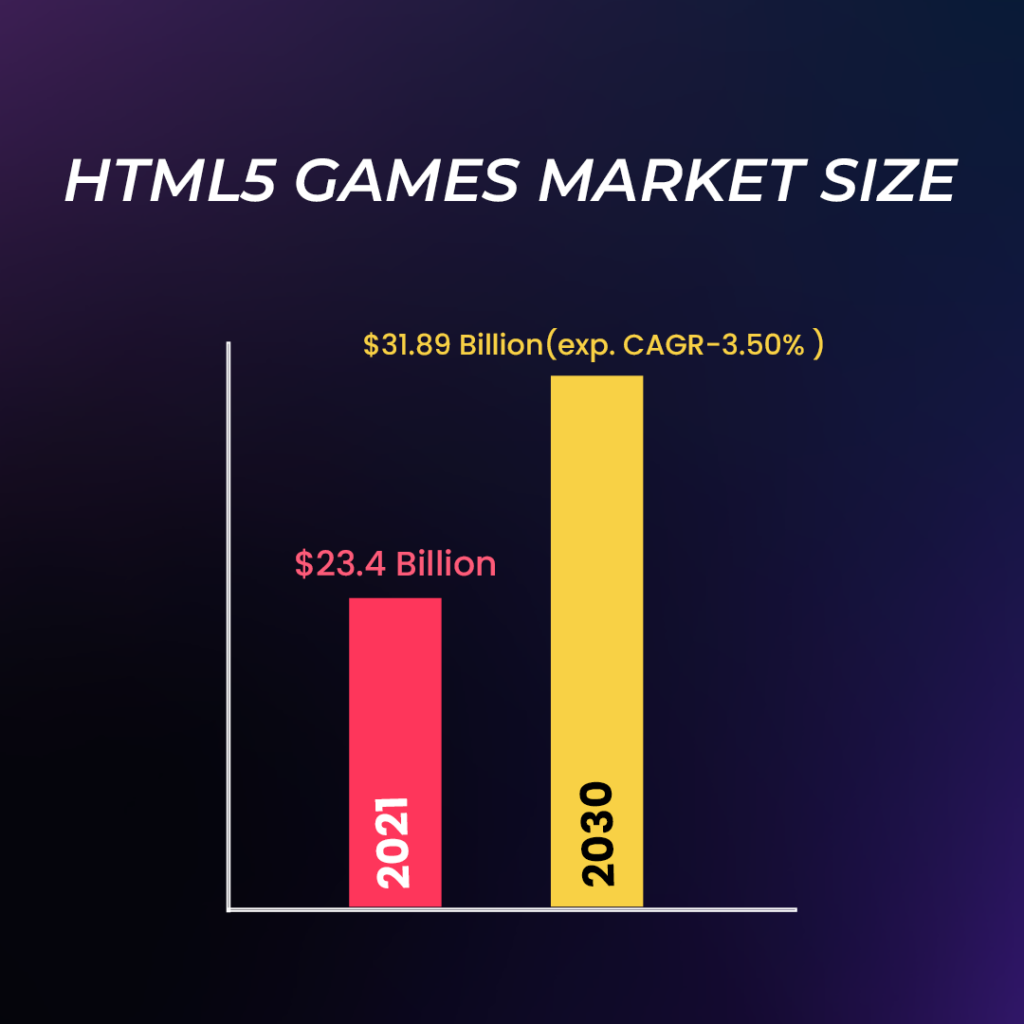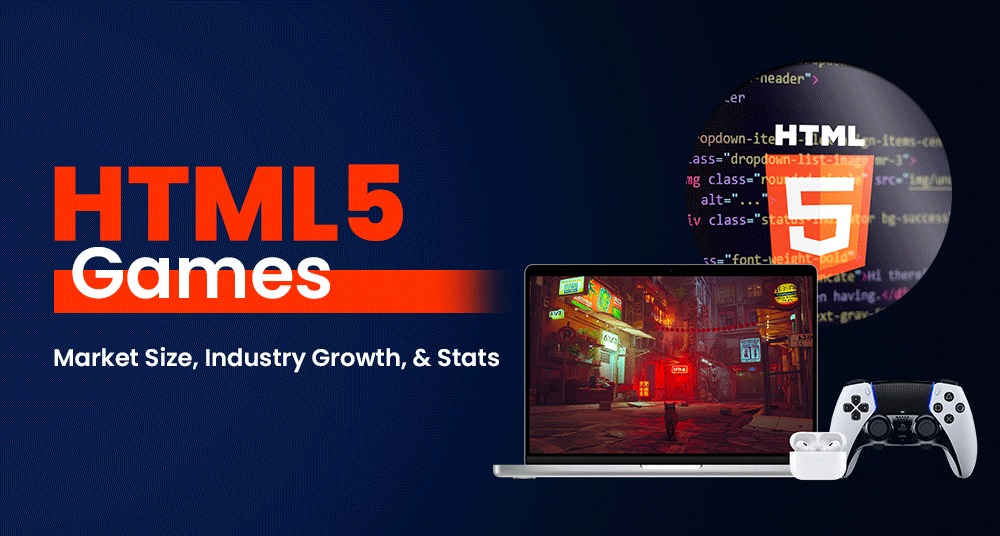The gaming industry is one of the most profitable industries worldwide, worth over $100 billion. As with any fast-growing industry, new game markets are emerging every day. Many new trends and niches in the online gaming industry have recently started gaining popularity among gamers.
With the advent of HTML5 as a universal standard for creating digital content, it has become much easier to build browser-based games. With this in mind, we are observing an exponential increase in the number of HTML5 games released daily.
Because of this, there’s no better time than now to look at the market’s current state and see what opportunities it can bring for game developers, marketers, advertisers, and other stakeholders involved in game creation and distribution.
HTML5 Games Market Overview
In 2021, as per the report by Beyond Market Insights, the HTML5 game industry market size was estimated to be $23.40 billion. However, the HTML5 online games market is expected to reach $31.88 billion by 2030, at a CAGR of 3.51%
It’s no secret that mobile games are currently the most profitable segment of the overall gaming industry. The market for mobile games alone is estimated to be over $50 billion. The popularity of HTML5 games is expected to rise over the next few years, thanks to the technology that powers them.
HTML5 Games Market Size
When we look at the market size of HTML5 games, we can see that it’s currently worth around $2.1 billion. Over the next few years, this number is expected to rise to over $7 billion, thanks to the technology’s ease of use and the large number of mobile users currently seeking such games. The popularity of mobile games is expected to grow even more when more developers start using HTML5 technology to build their games.
Mobile Game Development
Since most HTML5 games are designed for mobile devices, it makes sense to take a closer look at the segment of mobile game development. When building mobile games, many factors play a role in determining the cost of the final product.
The most important factors are the development team’s experience, the project’s complexity, the type of game and the number of functionalities, the type of programming language used, etc. Regarding the cost of building an HTML5 mobile game, you can expect it to be between $5,000 and $200,000. However, the average price is somewhere between $20,000 and $150,000.
2d/3d Game Developer
There are many different types of professionals who are involved in game creation. Depending on the type of game that you want to create, you might need the help of a programmer, an artist, a sound designer, an animator, etc. The cost of hiring a programmer with experience building 2d/3d games is usually between $15 and $100 per hour, depending on their experience.
An artist’s hourly rate usually ranges between $30 and $100, and a sound designer’s hourly rate is usually between $20 and $100. There are numerous benefits to hiring a game developer through an outsourcing firm. For example, you can expect to save up to 50% on your project’s development costs. Additionally, you’ll get access to a sizable database of qualified experts who can assist you in creating your game.
HTML5 Game Development
While many factors go into building a 2d/3d mobile game, the cost of an HTML5 game development is much easier to estimate. You can expect to pay anywhere between $10 and $100 per hour for a skilled programmer who can help you build your game. The cost of hiring a sound designer for your game can vary greatly depending on the type of game that you want to create.
For example, the cost of hiring a sound designer who specializes in building arcade games is usually around $50 per hour. The cost of hiring an artist for your game is usually much lower. You can expect to pay anywhere between $5 and $25 per hour for an artist’s help building your game.
HTML5 Games Statistics
Many interesting statistics about the current state of HTML5 games are worth looking at. For example, the average revenue per game is currently around $500. Nevertheless, the quantity can vary significantly depending on the game you create.
For example, arcade games have a much larger average revenue per game than puzzle games. Asian and American-based developers dominate the current market. However, it’s expected that European developers will soon surpass the current numbers and become the dominant force in the market.
What Benefits Come with Making HTML5 Games?
There are many clear advantages of developing HTML5 games compared to their native counterparts. Since browser-based games are cross-platform, you only need to create a single game that can be played on any device, which means you won’t have to create different versions for different operating systems, significantly reducing the overall cost of game development.
Another significant advantage of HTML5 games is that they don’t require any special software installed on a device. All you need to play these games is a web browser installed on almost any device nowadays, including smartphones, tablets, and desktop computers.
HTML5 Games Benefits for Developers
Developers have many reasons for choosing to build their games in HTML5. For example, they can expect to save up to 50% on their project’s development costs. Thanks to the technology’s broad compatibility, they can also expect to reach a broader range of customers.
Their games won’t be restricted to specific devices or operating systems. The popularity of the technology is expected to rise even more when the larger tech companies start implementing it in their products.
HTML5 Games Benefits for Users
There are many advantages for both developers and users when it comes to building games in HTML5. For example, the technology is universal and can be accessed by users on all devices and operating systems.
Customers will find it simpler to play your game as a result. Another advantage is that this technology makes creating 2d/3d games easier. Developers have a wide selection of game-building tools they can choose from.
The Rise of Browser-based Games & The Benefits They Offer to Players and Developers
Browser-based games are games that are played through a user’s web browser as opposed to being downloaded and installed on a device. People who play browser-based games has steadily increased since the early 2000s. This can be attributed to the rise of social networks and online communities, which have led to online gaming becoming a mainstream activity.
Most browser-based games are powered by JavaScript, a programming language that can be used to create almost any digital content. Thanks to the development of HTML5 as a standard markup language, JavaScript has evolved into a full-blown programming language that allows developers to create anything from simple “Hello, world!” programs to complex web apps. The primary purpose of HTML5 is to provide a standard way of encoding and organizing content for digital publication and interaction.
The Best Platforms for Developing Your Own HTML5 Game
While browser-based games were once created using simple HTML code, today, it’s possible to use a wide variety of tools and frameworks to create browser-based games. You can use frameworks such as Unity and Unreal Engine to build a game from scratch or some ready-made solutions for creating browser-based games.
Some of the most popular game-building platforms for creating HTML5 games include: –
Construct 2: This potent yet easy-to-use, drag-and-drop game builder enables you to create cross-platform games with ease, even if you have no experience in game creation. Construct 2 is perfect for 2D games like puzzle and platformer games.
Stencil: Stencil is one of the best tools for creating games suitable for all ages, such as match-three games, puzzle games, and retro-style games.
Clickteam Fusion 2.5: Fusion is a powerful tool with many features that let you create any game you want. It’s an excellent option for those who want complete control over their game development process.
A Brief History of HTML Gaming and its Timeline to Present Day
The term “HTML gaming” was first used in the early 2000s when browser-based games were gaining much traction. Since the rise of browser-based games coincided with the rise of social networks, many people began to view online gaming as a threat to the future of offline gaming.
The truth, however, is that social networks are an excellent way for people to interact and form communities based on shared interests. Due to the rise of browser-based games, the online gaming industry was soon given its niche and was identified as a separate branch of the gaming industry.
As time passed, browser-based games became more complex, utilizing the latest trends in artificial intelligence, VR, and AR technologies. Recently, a new trend called “WebXR” emerged and started to unite the separate branches of VR, AR, and MR technologies, thus creating a single standard for creating immersive, interactive content on the web. Some people even talk about “the death of native gaming” due to the increasing popularity of browser-based games.
What is the Market Situation for HTML5 Games Right Now?
According to 2021, the global HTML5 games market is expected to reach a valuation of $23.4 billion by the end of the year. The report also states that the market will grow by 3.5% annually over the next 9 years, reaching a valuation of $31.89 billion by the end of 2030. The ever-rising popularity of browser-based games is mainly due to several benefits they offer to both players and developers:

- Games played in a browser don’t need to have any additional software installed on a device. All you need to play these games is a web browser installed on almost any device these days, including smartphones, tablets, and desktop computers.
- Browser-based games are more accessible than ever due to new technologies like WebXR, making it easier for people to access the web and play browser-based games on their devices.
- Browser-based games are generally easier to create than their native counterparts, making them more accessible and appealing to game developers. The future of gaming is bright, and it’s currently being built in the form of browser-based games. As browser-based games offer their players the same or even better, experience than native games, their popularity will continue to grow and prosper.
What are the difficulties the market for HTML5 games is facing?
Like in any other industry, the gaming industry is not free from challenges and obstacles that may affect its future success.
Despite their advantages, browser-based games are often criticized for having a low-quality experience that can’t compare with the native experience of games installed on a device.
The latest technologies that enable browsers to run games are WebGL and WebXR. While WebGL has been around for quite some time, WebXR is a relatively new technology that enables users to access Augmented Reality (AR) and Virtual Reality (VR) content via web browsers.
The main problem with WebXR is that it hasn’t been standardized yet, making it difficult for browser-based games to compete with native games.
What Possibilities Does the Market for HTML5 Games Have in the Future?
Despite the challenges the market currently faces, the future of the HTML5 games market looks promising. Browser-based games will continue to evolve and gain popularity thanks to new standards developed to make them even better.
New technologies such as WebXR and WebGL 2.0 are expected to provide players with a richer experience and more in line with what native gaming offers. This will, in turn, help reduce the gap between browser-based and native games and will only help bring more players to the world of browser-based gaming.
The future of gaming is bright, and it’s currently being built in the form of browser-based games. As browser-based games offer their players the same or even better, experience than native games, their popularity will continue to grow and prosper.
Conclusion
The gaming industry is one of the most profitable industries worldwide, worth over $100 billion. As with any fast-growing industry, new game markets are emerging every day. Many new trends and niches in the online gaming industry have recently started gaining popularity among gamers.
With the advent of HTML5 as a universal standard for creating digital content, it has become much easier to build browser-based games. With this in mind, we are observing an exponential increase in the number of HTML5 games released daily.
Because of this, there’s no better time than now to look at the market’s current state and see what opportunities it can bring for game developers, marketers, advertisers, and other stakeholders involved in game creation and distribution.






What do you think?
It is nice to know your opinion. Leave a comment.